Update # 222
ECC donates generously to support KESKUS build

If you ask ECC (EKN) Chair of the Board Reet Marten Sehr why the organization believes in supporting KESKUS, the answer is simple, and comes from a deep sense of identity - to create a home where everyone with Estonian roots feels welcome and included.
Though the answer is simple, the path to get here has taken many years and much effort.
“This is the most important build that the Estonian community not just in Canada, but globally has undertaken in the last 70 years,” she said. “KESKUS is an opportunity for renewal. It will provide a fresh start.”
The Estonian Central Council in Canada has stepped forward with a $50,000 Koidula Gild donation to help secure that future. Read more here about the levels of giving.
“Our Board is thrilled to be making this donation.”
Education helps our culture thrive
Reet, a long-time educator, now retired, is a former elementary school principal in Ontario’s Peel Region. She also held senior positions at the Ontario Ministry of Education and the faculty of education at the Ontario Institute for Studies in Education. She is Vice Principal of the reestablished Toronto Estonian Kindergarten and has eight grandchildren, all of whom participate actively in the Toronto and Stockholm Estonian communities.
Reet believes whole-heartedly in the power of education.
“I love the little ones,” she said. “And continuing our Estonian schools at KESKUS will be such a vital part of the activities there. Our focus must be on youth, so we can nurture our community and help it grow and flourish.”
ECC’s history in Canada spans over seven decades

ECC, known in Estonian as Eestlaste Kesknõukogu Kanadas (EKN) has a long history sparked by the vision of Estonian immigrants to Canada and was founded in 1951 by former members of Estonia's parliament, cabinet ministers in exile, and political activists.
For this group of stalwart individuals, the fight for liberation took on new vigour as their feet left the soil of the homeland. In those early years, the organization’s main goal was to develop relationships with Canada’s political parties and levels of government, and bring attention to the unlawful occupation of Estonia by the USSR.
It must have at times seemed like an uphill battle, but those early members persevered.
“After Estonia regained its independence in 1991, our community shifted its focus to providing political and financial support to the country. As Estonia built its profile and successfully integrated into international bodies such as the UN, NATO and the European Union, ECC began focussing on developing stronger relationships and communication networks with the Estonian government and diaspora communities. Today, it is the official representative of Estonian-Canadians with both Estonian and Canadian governments,” Reet explained.
ECC members come from across Canada
Over the past several years, the ECC board revitalized the organization with a revamped governance structure as per requirements for incorporated Canadian not for profit organizations. New members are Estonian associations and organizations from across Canada, thereby creating a stronger central organization that reflects our local communities and truly representing who we are.
“We want to strengthen our communities, bring people together and reinforce networks,” said Reet. “It’s critical that we have a unified voice so we can stand strong and help repel Russian aggression.”
Several new members joined the ECC board, including Andres Kasekamp, Professor in the Department of History and the Chair of Estonian Studies in the Munk School of Global Affairs and Public Policy at the University of Toronto.
“Every community needs a home to be the centre of its activities. We cannot turn back, so we must push forward and help complete KESKUS as quickly as possible to ensure the future of our community,” Andres said.
His background and expertise will be extremely valuable in his role as ECC board member.“With Russia's war on Ukraine negatively impacting the security of both Estonia and Canada, ECC needed to strengthen its geopolitical expertise,” he explained. “As I worked closely with the Estonian Ministry of Foreign Affairs while living in Estonia for over 20 years, I can contribute to building a stronger relationship with the Estonian government.”

Global “Estonianism” a key focus
Reet’s passion is building global relations with Estonia and Estonians living outside the country.
“Estonia is a small country, and 200,000 of us – or one in five - live elsewhere,” she said. “Having a strong diaspora is important. It’s vital that we stick together to build our capacity and profile.”
ECC did much of the groundwork in bringing a resolution to the Estonian government on establishing the Global Estonian Program, which now has a Special Diplomatic Representative, Marin Mõttus, as well as two full time advisors.
“We invite young Estonians living abroad to strengthen their ties with Estonia,” Marin states in a message on globalestonian.com, and describes language courses, grants and summer camps that are available for Estonian youth who live abroad.
Reet explains: “The Global Estonian Program benefits our communities in a number of other ways as well. It brings awareness to the Estonian government about who we are and what we’ve accomplished, and forges ties with citizens there as well.”
Growing the community is both a must and a challenge: Laas Leivat
KESKUS was fortunate to speak with Laas Leivat, long time ECC director earlier this year in the course of preparing this article. Laas, was also Estonian Honorary Consul General in Toronto. He passed away on January 19, 2024.

A respected knowledge-keeper in Canada’s Estonian community, Laas had a deep understanding of the importance of keeping the diaspora alive and well.
“How do we help people understand they are Estonian?” he said. “If we want to keep our culture alive, we have to come together strongly as a community, as there is no question our organizations have decreased in size.”
He added that it’s a huge challenge to engage with young people, especially if they don’t speak the language.
‘We have to encourage our young people to get excited and connected to their Estonian roots. Everyone must be made to feel welcome in our community.”
Instilling cultural pride and knowledge to our young people is vital, as they are the ones who will carry on the Estonian legacy, but how do we do that?
“I have been thinking about this for 30 years,” Laas said. “I’ve seen how young people go to the song festival in Estonia, for example, and get a rush of pride from being there. We must have engaging activities here that elicit that same feeling. It’s how we will survive as a culture.”
Laas said it’s important as well to have a network that ties us together globally, and to exploit the use of technology fully in order to do so.
“KESKUS is probably the biggest gift our community has ever given to our homeland,” he said, and added that the government in Estonia is spending more effort on building global networks.
“There are a number of very astute civil servants working on this in the areas of foreign affairs, culture and education - and ECC has been pushing to develop this capacity for some time.”
Laas recalls his days with the Canadian Navy in the 1960s when one of his responsibilities was searching for Russian submarines.
“My colleagues would ask me if I was Estonian or Canadian. I said both, and I don’t have a problem with that!”
It is a gift to have a foot in each culture.
“We can be proud of the fact that we can exist as full-fledged Estonians as well as proud Canadians.”
“We need to get it done”
Reet sums up her thoughts: “KESKUS is a project that is critical to our community. It will be a unifying force that brings us all together.”
She said now is the time for the Estonian community to come together to support it.
“We need to remember the past, and look forward. KESKUS will honor our history and pave the way for the next generation. We need to get it done!”

Discover the benefits of giving wisely
Please join the growing list of KESKUS capital campaign donors to help bring this extraordinary project to completion. KESKUS leadership donors are recognized here.
There are many ways to make a contribution to KESKUS.
To donate, click here, or call +1.647.250.7136 or email donations@estoniancentre.ca. Donations may be made as a family gift, or in honour of an individual or family. All donations are issued a tax receipt, in Canada via Estonian Arts Centre, US tax receipts via Myriad USA and Estonian tax receipts via Eesti Rahvuskultuuri Fond. Donations by credit card may be made here.
Legacy gifts made to the Estonian Arts Centre, the charity associated with KESKUS, are creative and tax-effective ways to provide support. These are known as “planned gifts” because with thoughtful planning, we create a win-win situation that benefits both you and our community for generations to come. Find out how to provide a bequest in your will by going to www.estoniancentre.ca/bequest.
For information on making other types of planned gifts, including gifts of appreciated securities or insurance policies, or if you have any other questions, please contact EAC Donations Manager Taimi Hooper via email at donations@estoniancentre.ca or phone +1.647.250.7136.
Let’s keep in touch

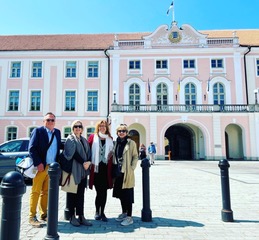
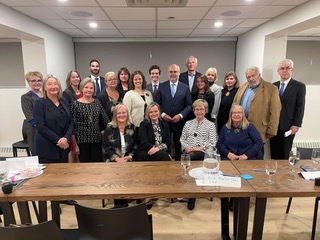
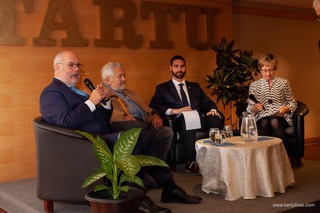
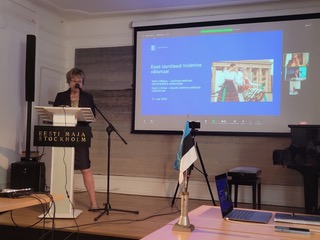
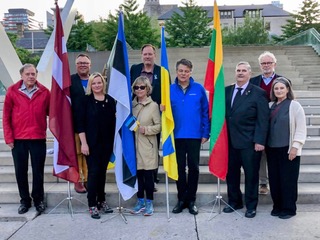


Comments